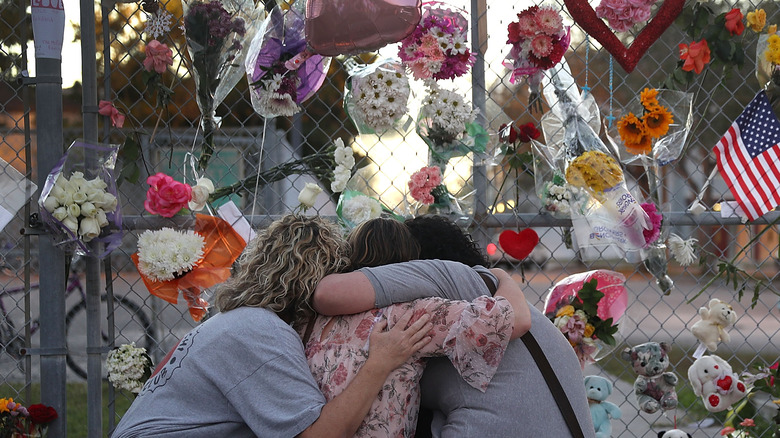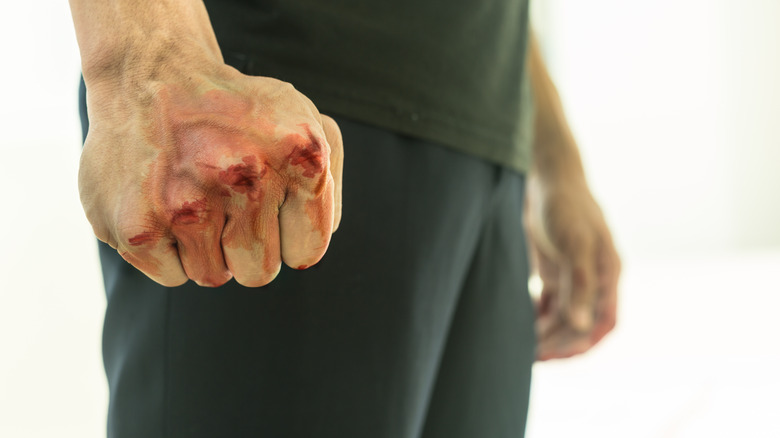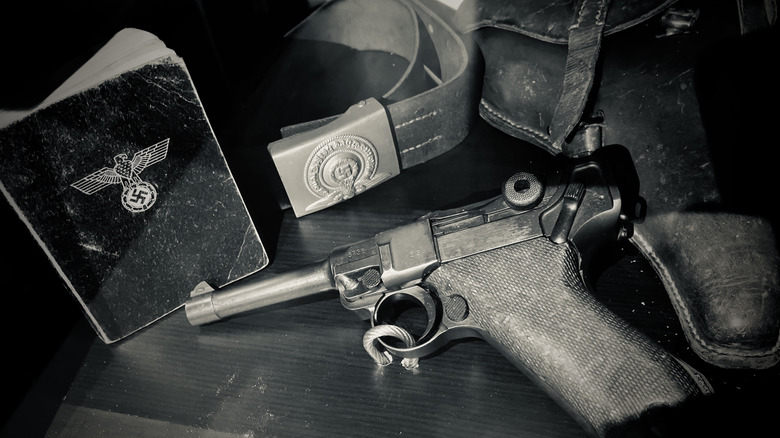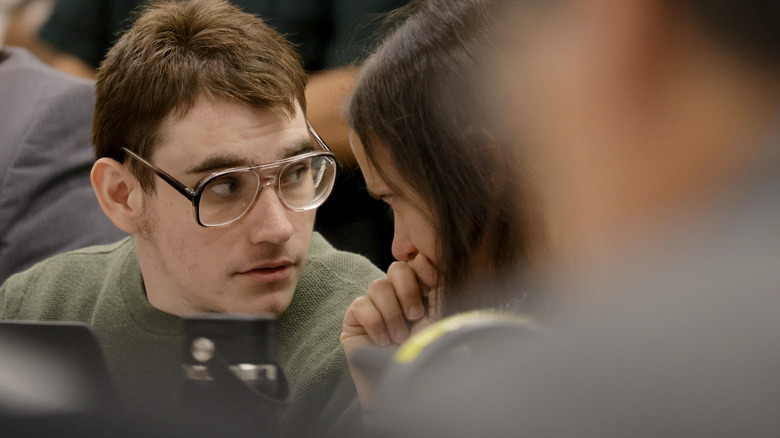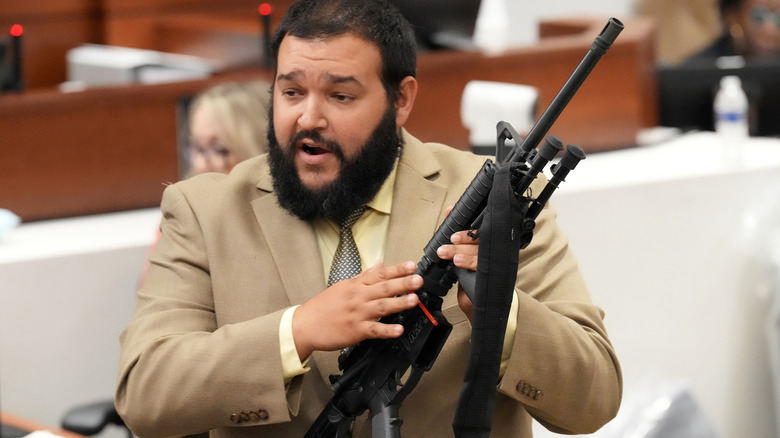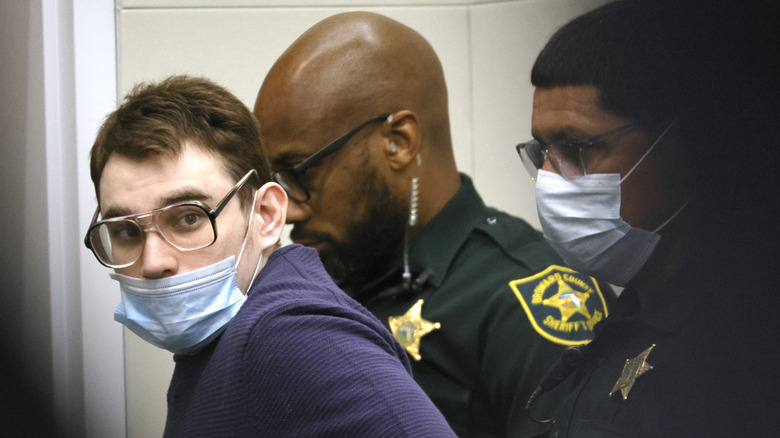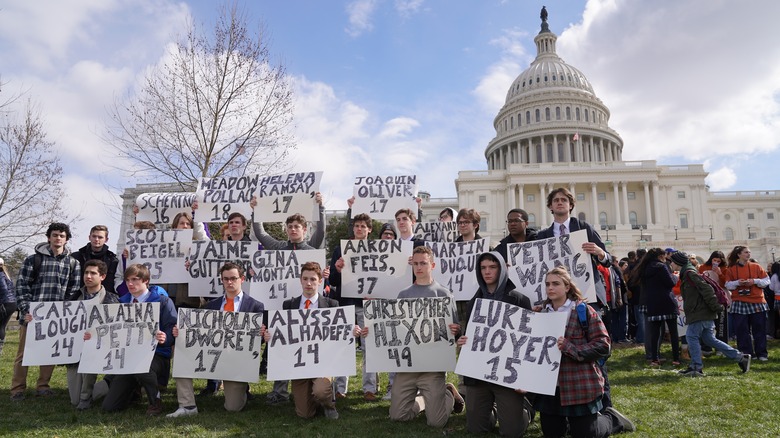Marjory Stoneman Douglas High School's Eerie Connection To Another Mass Shooting
Separated by decades, two American children found themselves huddled in closets while spree killers hunted for victims. In 2018 Parkland, Florida, the last line of defense between senior high school student Carly Novell and her cohort from their would-be murderer was a closet door (via The Cut). For two hours, Novell comforted the panic-stricken classmates around her (via ABC News). The mass shooting trend in America remained unabated, going strong after 70 years. Before 1950, the concept was completely foreign to Americans.
In tranquil Camden, New Jersey, in 1949, 70 years of spree killer shootings began (via Smithsonian Magazine). The shots from a German luger rang out in a measured cadence down the streets of the suburban town center. A 12-year-old boy named Charles Cohen was drawn to the window of his family's apartment by the noise (via The New York Times). Below he saw a slain insurance salesman sprawled on the sidewalk (via the Los Angeles Times). The young Cohen had no way of knowing that down the block, a 2-year-old recently came to a window and was met with a decisively delivered bullet to the head.
In an instant, swift footfalls ascended the stairs to the Cohens' apartment from their family-owned pharmacy below. Mrs. Cohen called out " (via the Los Angeles Times), "Hide, Charles! Hide!" Charles Cohen was thrown in his closet, and when it opened, he discovered a new and resilient brutality for America and the rest of the world.
The rage and vendettas of Unruh
Howard Unruh killed many times before he was considered the first mass/spree murderer in U.S. history (via Smithsonian Magazine). He was sent to World War II a shy high school graduate with humble ambitions and came back a decorated soldier. But his brother said that Unruh "never acted like his old self" again.
Unruh's violent behavior blended into the landscape of World War II. He displayed both marksmanship talents and a gory fixation on his military kills (via "Rampage" by Harold Schechter). Unruh took detailed notes on the location, time, and, when possible, the post-mortem visage of each victim (via All That's Interesting). These notes likely served as gruesome souvenirs, allowing Unruh to revisit the experience of killing. Upon returning stateside, he languished without goals or direction in a prosperous post-World War II America.
Likely frustrated with his failings, psychiatrists later described Unruh as angry at the world. The subjects detailed in Unruh's notebooks became the personal and petty grievances of a suburban loner. According to "The Serial Killer Files," perceived violations of Unruh's mores were recorded and marked with cryptic messages such as "do not delay retaliation." He had numerous issues with his neighbors, including the owners of the local pharmacy, the Cohens. Mr. and Mrs. Cohen — as well as young Charles — were on Unruh's list for vengeance because of his loud trumpet practice.
The walk of death through camden
Howard Unruh's rage was invisible to many. According to Smithsonian Magazine, tailor Tom Zegrino described Unruh as "polite" and "the kind of guy who wouldn't hurt a flea." Unruh's wife, Helga, said he was "devoted to his mother." That might have been true — until the day of his rampage.
Before Unruh began what's known as his "walk of death," he held a wrench above his mother's head with a blank stare. To spare her the indignity of being the mother of a killer, he wanted to kill her first. For each slow step Unruh took forward, she stepped back, repeating over and over to her towering son (via Smithsonian Magzine), "What do you want to do that for, Howard?" But Howard couldn't bring the weapon down, and she ran out of their apartment to the neighbors. Unruh used his marksmanship to deliver headshot after headshot to numerous victims. In 20 minutes, he had murdered 13 people and wounded three others, including people on his list, strangers, men, women, and children.
The 1950s Camden County judge signed an order of commitment for Unruh based on a psychiatric diagnosis that is now outdated. Per Smithsonian Magazine, Unruh was said to experience "dementia praecox, mixed type, with pronounced catatonic and paranoid coloring." At the time, "paranoid schizophrenia was kind of a trash-can diagnosis," professor of forensic psychology Katherine Ramsland explained to the outlet — a label placed on difficult-to-diagnose cases. "But the criteria have tightened up since."
If you or someone you know needs help with mental health, please contact the Crisis Text Line by texting HOME to 741741, call the National Alliance on Mental Illness helpline at 1-800-950-NAMI (6264), or visit the National Institute of Mental Health website.
Shooting at marjory stoneman douglas high school
On the morning of February 14, 2018, Carly Novell and her classmates responded to the second fire drill of the day. While exiting their journalism class, they were met by administrators yelling down the hall to return to their rooms (via The Cut). "It is a code red!" they said. Novell was pushed into her own closet — decades after her grandfather, Charles Cohen, was pushed into his.
Over the past 70 years, the oppressive backdrop of American gun violence has normalized mass shooter awareness in schools. Today's students openly discuss the disturbing behaviors displayed by troubled classmates and wonder. At Marjory Stoneman Douglas High School, a number of students believed if their school was to have an active shooter, it would be Nikolas Cruz (via the MSDHS Public Safety Commission). At the age of 19, Cruz took an AR-15 semiautomatic rifle to the high school where he had recently been expelled. He began firing haphazardly down hallways and into classrooms (via History). In less than four minutes, Cruz had killed 17 and injured another 17 (via Insider).
Cruz's warning signs
Nikolas Cruz's gruesome and violent behavior was evident to his community, unlike Howard Unruh's silent cauldron of rage. In the continued attempt to sort out the warning signs and potential missed opportunities to avoid a violent spree, the Marjory Stoneman Douglas Public Safety Commission interviewed dozens of people in Cruz's life. They found that Cruz displayed numerous features of antisocial personality disorder, such as disregarding the needs or feelings of others and dangerous behavior (via Mayo Clinic).
Cruz enjoyed sharing his violent fantasies and actions in person and online. He tortured and killed animals, even posting pictures of frogs with their guts removed. He demonstrated an intense interest in weapons and violence toward people. While Unruh's room was adorned with Nazi paraphernalia, they were spoils from his time at war. Meanwhile, Cruz idealized the Nazis, drawing swastikas on his backpack and wrists. He spewed hatred toward groups such as gay or Jewish people. Wearing U.S. Army emblazoned clothing on Instagram, Cruz described himself as an "annihilator." He imagined bringing the violence he'd seen against others — such as the shooting at the Pulse nightclub — to his school.
Cruz would often berate his mother, saying she should kill herself or he'd do the job for her. Incidents often turned physical. He was a pathological liar who used manipulation to get out of disciplinary consequences. Cruz's mother told confidants, "If anything happens to me, you know it was Nick."
If you or someone you know is dealing with domestic abuse, you can call the National Domestic Violence Hotline at 1−800−799−7233. You can also find more information, resources, and support at their website.
Two different kinds of killers
These men match the FBI crime classification of a mass murderer: a person who kills four or more people in a single incident (not including themselves), typically in a single location. Yet Nikolas Cruz is a significantly different killer than Howard Unruh in behaviors and temperament. For example, unlike Cruz, Unruh didn't display delinquent or criminal behavior as a juvenile. But both killers display psychopathy features, including a lack of remorse for their violent actions (via Nature Reviews Disease Primers). Though likely experiencing different mental illnesses, the gun violence they manifested was equally horrific.
In Smithsonian Magazine, Katherine Ramsland suspected that "Unruh had a personality disorder." Certain features of obsessive-compulsive personality disorder listed by the Mayo Clinic — such as the "desire to be in control of people, tasks and situations” and "inflexible about morality, ethics or values" — accurately describe Unruh's obsession with vendettas. Unruh's inconceivable actions led mid-century authorities to conclude he was a mental deviant. However, Ramsland believes "it's clear he knew what he was doing was wrong and that there were legal consequences."
The silence and voices of victims
Charles Cohen likely discovered he was an orphan upon leaving his closet. He didn't discuss the event, postponing until their honeymoon to tell his wife (via ABC News). For years, the Cohens kept the family tragedy from their daughters. America didn't want to talk about it either. "[Howard] Unruh's killings were seen as a weird aberration," said famed true-crime author Harold Schechter in a piece by Smithsonian Magazine, "so he didn't immediately enter into a larger American mythology." Instead, Unruh was assigned the label "criminally insane" and locked away.
Cohen spent his life waiting for the call that Unruh was dead. "I will then have closure for my family," he said. Unfortunately for Cohen, that call never came. Both Charles Cohen and Howard Unruh died in 2009, with Cohen passing first (via Courier Post). Cohen's granddaughter took to advocacy soon after her traumatic brush with a spree killer. While she hid in a closet, much like her grandfather decades earlier, she left with a commitment that "these events shouldn't be repetitive" and "something has to change," as she wrote on Twitter.
For modern spree shooters like Cruz, the prospect of a lifetime in a mental health institution is implausible. Ramsland explains that the current standard for judging legal insanity is "are you so floridly psychotic that you don't know what you're doing is wrong?" Cruz's antisocial actions have landed him in jail with a death penalty trial (via Business Insider). While the Parkland survivors continue their vocal support for gun control, their spree killer currently awaits his sentencing.
